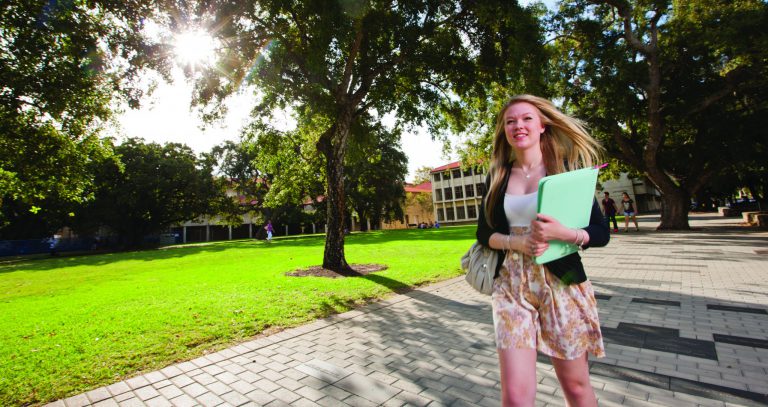
Postgraduate studies in the humanities and social sciences have been proven to aid tremendously in the development of soft skills, which are deemed to be vital in the modern workplace.
A recent study conducted by career website CareerBuilder found an overwhelming majority of companies say soft skills are just as important as hard skills. It was found that 77 percent believe that soft skills (less tangible skills associated with one’s personality, such as a positive attitude) are just as important as hard skills (skills that are learned to perform a specific job function, such as programming).
Another 16 percent, according to a 2014 survey by Harris Poll, said soft skills are more important than hard skills when evaluating candidates for a job.

Pic: The University of Western Australia
“When companies are assessing job candidates, they’re looking for the best of both worlds: someone who is not only proficient in a particular function, but also has the right personality,” said Rosemary Haefner, vice president of human resources at CareerBuilder.
“Along with responsibilities, it’s important to highlight soft skills that can give employers an idea of how quickly you can adapt and solve problems, whether you can be relied on to follow through and how effectively you can lead and motivate others.”
One Harvard undergraduate has described a humanities education as one that teaches creative, outside-the-box thinking.
“In a world where the next big idea can give birth to a multimillion-dollar startup, thinking is a valuable commodity,” Matthew DeShaw said in the Harvard Correspondent.
In a short period of time, DeShaw said humanities studies made him become a more well-rounded citizen of the world after learning about Roman history, and reasoning, analysis, and using evidence to draw independent conclusions.
“This course opened up my perspective, which led me to pursue opportunities in humanities research, as well as an archaeological dig program in Rome this past summer,” he said.

Pic: Pixabay
The qualities espoused in humanities and social sciences graduate school programs produce polished individuals with excellent soft skills. These candidates are ones who come out on top in many workplace environments and are naturally suited for leadership roles due to their acquired abilities to effectively manage people and time.
Leaders who demonstrate excellent soft skills are among those who are able to give directions to people with a persuasive flair that influences them to strategically pursue the organisations’ goals and objectives. This is done with the aim of producing the best outcome and results. These leaders are also adept talkers and writers who can make valuable contributions to things such as company annual reports, build bridges with outside partners, and entice clients and stakeholders to have more confidence in the organisations they represent.
Soft skills also allow technical professionals, such as programmers and engineers, to effectively convey the broader implications of what they are doing. They allow professionals in a multitude of sectors to better explain their roles to other people so that their ideas and proposals can be better understood by those unfamiliar with their areas of expertise.
In short, professionals and business people who have soft skills (whether in the technical field or not), are generally well-rounded individuals who move on to succeed in their chosen fields.

Pic: University of Ottawa
One rationale behind the vital need to adopt soft skills is that there is an increased focus on the ability to get on with those we work with, which is required even more so now that there is greater connectivity in the globalised world, as well as in our own environments. Invariably, that focus – which is applied during job interviews right up to business negotiations – is bound by first impressions of others and their perceptions towards us.
In a recent academic study entitled, Graduate Employability, ‘Soft Skills’ Versus ‘Hard’ Business Knowledge: A European Study, authors Jane Andrews and Helen Higson identified professionalism; reliability; the ability to cope with uncertainty; the ability to work under pressure; and the ability to plan and think strategically among the traits contained in the soft skills.
The duo also mentioned the capability to communicate and interact with others, either in teams or through networking; good written and verbal communication skills; information and communication technology skills; creativity and self-confidence; good self-management and time-management skills; and willingness to learn and accept responsibility.
In helping to master these skills, which are so highly sought-after by employers, higher learning institutes have developed advanced courses at the postgraduate levels. These courses have been prepared in order to share insights into the world and to encourage lateral thinking, enabling graduates to make significant impacts on real-world working environments.
Let’s take a look at some faculties that offer top class postgraduate programs in the humanities, arts and social sciences:
The University of Western Australia (UWA), Faculty of Arts – Australia
Located in Perth, the Faculty of Arts at The University of Western Australia offers a wide array of courses catering to those wanting to build their undergraduate studies, or are experienced professionals vying to enhance their credentials. The university’s diverse range of coursework degrees includes Asian Studies, Heritage Studies, International Development, International Relations, Music International Pedagogy, Social Research Methods, Strategic Communication and Translation Studies. At UWA, postgraduate students enjoy a high quality Australian education where they are educated by world-renowned academics, study with like-minded peers and create professional connections worldwide. The Excellence in Research for Australia (ERA) Rankings recently placed UWA in the top six, out of 43 in the country, while the QS World University Rankings placed it at 98th in the world.
University of Dundee, School of Humanities – United Kingdom
Known as an internationally recognised centre for research since its formation in 1881, The University of Dundee offers a highly conducive study environment to those wanting to pursue a larger understanding of the world through culture and creativity. The faculty covers a host of critical areas such as history, literature, comics and media, creative writing, continental philosophy, modern languages, and practice-based archival education, among others. Ranked 261st worldwide in the 2015/16 QS World University Rankings, the university prides itself as the home of Scotland’s liberal arts degree, through the infusion of broad-based education and a myriad of opportunities for specialisation. The rankings are certainly reflected through its £200 million redevelopment program, aimed at improving its art platforms for teaching, research and partnership activities.
University of Ottawa, Faculty of Social Sciences – Canada
The Faculty of Social Sciences at the University of Ottowa is made up of nine units, including six departments, two schools and one institute, which incorporate a range of interdisciplinary work. Situated in Canada’s cosmopolitan south-eastern capital, which borders Québec, the faculty promises a commitment to research, teaching and engagement in light of its 60th anniversary celebration last year. The university’s foray into social sciences began in 1936 when it set up its the School of Political Science, nearly two decades before the faculty was formed. The school, along with its psychology counterpart, has been at the heart of the faculty since its inception in 1955. With over 1,300 graduate students, the number of enrolments at the faculty has doubled over the past decade owing to the creation of two of its newest schools; the Graduate School of Public and International Affairs in 2007 and the School of International Development and Global Studies in 2008, apart from other unique interdisciplinary programs.
Massey University, College of Humanities and Social Sciences – New Zealand
Massey University has over 35,000 students enrolled, more than half of whom have opted to do external or distance-learning studying. The university’s College of Humanities and Social Sciences places a strong emphasis on research tradition and profile, representing a diverse range of themes, research methods and groups, from individual researchers to major research teams and centres. The college consists of the School for Defence and Security Studies, Institute of Education, School of English and Media Studies, School of Humanities, School of Māori Art, Knowledge and Education, and School of People, Environment and Planning, and School of Psychology.
Ohio Northern University, Getty College of Arts & Sciences – United States
The Getty College of Arts & Sciences is known as a breeding ground for the artists, musicians, writers, doctors, teachers and scientists of the future, covering a wide range of studies in the liberal and fine arts, sciences, and pre-professional programs. Founded in 1871, the university has nearly 3,000 students enrolled in its undergraduate programmes. It is currently ranked second best in U.S. News & World Report’s 2016 edition of Best Colleges, for the (Midwest) Regional Colleges category. Although it is associated with the United Methodist Church, the institution promotes universal values in line with its mission to provide a high quality learning environment.







